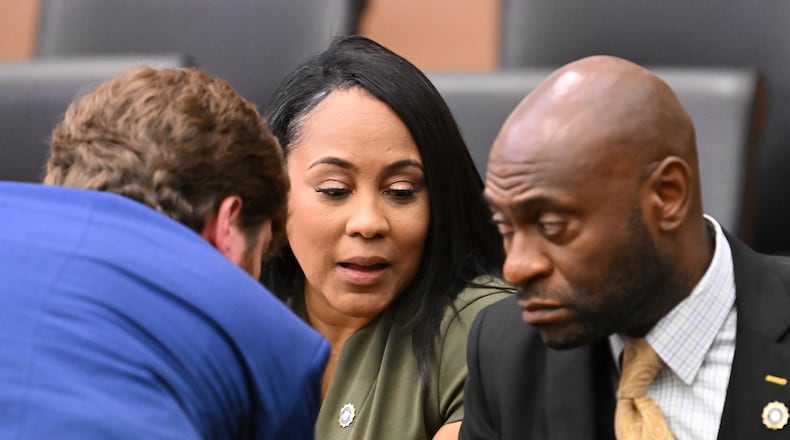A broad coalition of news organizations is urging a Fulton County judge to make public a special purpose grand jury’s report on whether former President Donald Trump and his allies violated Georgia law after the 2020 election.
The Atlanta Journal-Constitution, The New York Times, ABC and more than a dozen other news outlets filed a motion Monday saying there is no legal justification for sealing the results of the special grand jury’s investigation.
“The public interest in the report is extraordinary,” the motion said. “The court should file the report in the public docket and publish it ... as the special purpose grand jurors have requested.”
Superior Court Judge Robert McBurney will hear arguments Tuesday on the issue from the District Attorney’s office, the news media and, possibly, lawyers representing targets of the eight-month-long probe.
On Monday, Trump’s Georgia-based legal team issued a statement saying the former president was never subpoenaed to testify or asked to come in voluntarily. The attorneys — Drew Findling, Marissa Goldberg and Jennifer Little — also said they will not attend or participate in Tuesday’s hearing before McBurney.
“The grand jury compelled the testimony of dozens of other, often high-ranking, officials during the investigation, but never found it important to speak with the president,” the lawyers said. “Therefore, we can assume that the grand jury did their job and looked at the facts and the law, as we have, and concluded there were no violations of the law by President Trump.”
The special-purpose grand jury was told to investigate whether there was a premeditated effort to disrupt the Georgia election. Although a special purpose grand jury does not have the power to issue indictments, the jurors were instructed to recommend criminal charges if they thought they were warranted. When it was dissolved Jan. 9, the jury asked that its final report, which has so far been under wraps, be made public, McBurney noted in a recent order.
The media coalition is arguing the report is a court record subject to the presumption of openness under the U.S. Constitution, the Georgia Constitution and the Superior Court system’s uniform rules.
“There are no countervailing interests sufficient to overcome the presumption,” the filing said. It also notes that the investigation “has been one of enormous public interest not just to Georgians, but also to citizens throughout the U.S. The scale and scope of news organizations filing this brief reflect the profound public interest in this issue.”
Other members of the media coalition are CBS, CNN, The Associated Press, Bloomberg News, WSB-TV, WXIA-TV, The Wall Street Journal, Gray Television, Yahoo! News and Gannett Co. and its newspapers: USA Today, the Athens Banner-Herald, The Augusta Chronicle and the Savannah Morning News.
Because the special grand jury cannot issue indictments, the decision to seek charges will be made by District Attorney Fani Willis before a regularly seated grand jury. Willis has not said what position she will take on whether the final report should be published right away.
There is court precedent in Georgia that says a grand jury’s report, also called a presentment, must not contain information that goes beyond the panel’s charter — what it was instructed to do in the first place. The report also should not contain language that impugns the character of an individual, according to state Court of Appeals decisions.
Likely questions to be addressed at Tuesday’s hearing will be if the report does recommend criminal prosecutions against certain individuals, was that outside the special grand jury’s charter and does that impugn a target’s character? And, if so, does that mean the full report or parts of it should be kept under wraps?
As to the question of scope, any recommendation for criminal charges does not appear to be outside of the special grand jury’s charter. In his Jan. 24, 2022, order authorizing the special grand jury, then-Chief Judge Christopher Brasher wrote the special grand jury “may make recommendations concerning criminal prosecution as it shall see fit.”
As a matter of both practicality and fairness, stating that someone may have committed a crime but not actually charging that person may give McBurney pause as he decides whether to make the full report public. McBurney oversaw the special grand jury during its investigation.
Legal experts, including former DAs who advised their own special purpose grand juries, are split as to whether the report can be made public if it recommends certain individuals be prosecuted. This is likely because special grand juries are rarely used and there are few court precedents to follow.
In a 1988 opinion, though, the Georgia Supreme Court said that a move to limit public access to a court document “shall not be granted except upon a finding that the harm otherwise resulting to the privacy of a person in interest clearly outweighs the public interest.”
That decision was cited in the motion filed by the news media coalition. So, too, was a landmark open courts ruling in 1980 by the U.S. Supreme Court that said: “People in an open society do not demand infallibility from their institutions, but it is difficult for them to accept what they are prohibited from observing.”
Special care must be given to grand jury proceedings because their work is done in private, the motion conceded. But this grand jury’s final report qualifies as a court record that must be made public, it said.
“There is no basis for sealing here,” said the motion, written by Atlanta lawyers Tom Clyde and Lesli Gaither. “This investigation has been a matter of profound public interest that goes to the heart of the nation’s democratic forms of government. ... There is quite simply no ‘clear and convincing proof’ that sealing, either in whole or in part, is warranted.”
The Latest
Featured




